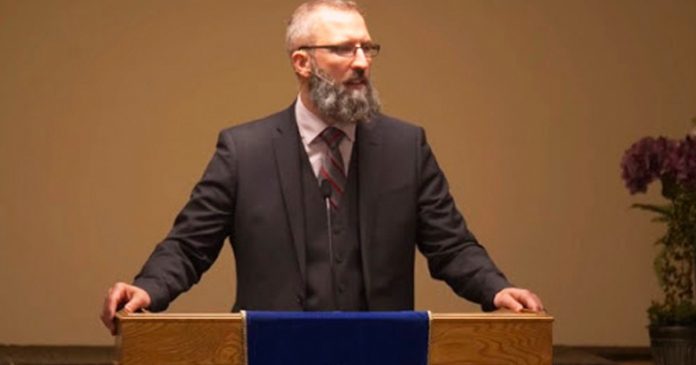On Day 15 of the Emergencies Act hearings, more Freedom Convoy representatives took the stand including Convoy lawyer Keith Wilson, representative Tom Marazzo and live-streamer Patrick King.
The proceedings were temporarily halted during King’s testimony after a heated exchange between him and Ottawa lawyer Paul Champ who was questioning him.
It started when Champ asked King if the Convoy had caused downtown Ottawa to become a “dangerous situation.”
“Not at all. I met the most loving, most caring people,” said King. “Everywhere you went you were getting hugs, you were getting handshakes. Nobody was violent.”
Champ then asked King why he needed to have security with him during the Convoy. King responded that he had people threatening his life.
“People were dropping marbles from high-rises,” said King. “They were throwing eggs, and the citizens of Ottawa were threatening to run us over.”
“You know my lawyer was given death threats and bomb scares because she represents me?” said King.
Champ, frustrated, then spoke directly to the commissioner.
“The people of Ottawa got one morning in this proceeding, we’ve had a week of all these Convoy organizers given a platform to say whatever they want.”
Commissioner Rouleau decided to pause proceedings as some shouting began to take place. The commission decided to finish for the day.
Earlier in the day, Convoy lawyer Keith Wilson testified the government had overstepped during the Convoy.
Wilson questioned when exactly the Freedom Convoy became an illegal assembly and understood its illegality had not been grounded on any basis.
“It just seemed to be a terminology that started to morph and become adopted with no particular triggering event,” said Wilson.
Wilson noted that around Feb. 4, he felt a “change in tone” from the police and began looking for ways to de-escalate the situation.
He said that by this time, Tom Marazzo had been working with police liaison teams but felt it was not going anywhere substantive.
“He needed somebody that was more of an inspector level, somebody who had some actual decision making capability and greater authority,” said Wilson.
Wilson says Convoy organizers wanted to help police clear the Rideau Sussex intersection in order to relieve pressure from the police due to its proximity to the Senate and US Embassy.
On Feb. 8, Wilson says the officer on the phone told organizers that they can’t move barricades to allow them to move to Wellington St.
“They felt that the police had double crossed them,” Wilson says.
Wilson says they decided to draft a Freedom manifest, in order to focus their efforts on Wellington and to get trucks out of residential areas.
A Feb 12 email showed Wilson hoping that the deal in the manifest would keep Prime Minister Trudeau from using the Emergencies Act and allow trucks to stay in a certain area in the city.
Wilson says 850 copies of the manifest were printed to hand out among the truckers.
Wilson said good faith negotiations were at the core of his thinking in the days during the invocation. He wanted to de-escalate the protests in order to bring the federal government to the table.
Wilson says he believes they could have had a peaceful resolution and a respectful dialogue about the Convoy’s concerns to end the overall protests without police intervention.
After the break, Tom Marazzo took the stand. He was interested in the Convoy because he had lost his job at Georgian College in Sept 2021 due to the vaccine mandate. Marazzo said he became increasingly wary during the pandemic and that he was afraid of police for the first time despite having friends in the force.
Marazzo was in touch with James Bauder, another Convoy organizer from Canada-Unity, who was planning a similar protest before getting in touch with Brigitte Belton and Chris Barber. Bauder asked him to get involved with the protests.
“It was the truckers that gave me an opportunity to fight for my kids’ rights,” Marazzo said.
Marazzo was very concerned about having emergency lanes open at all times because his son has a heart condition. Marazzo’s role was to organize logistics making sure people had fuel and food. Marazzo says he was likely appointed because he had experience in the military.
Marazzo says he found the protest to be very decentralized. Many truckers were largely independent contractors who didn’t want to listen to him.
“You had to use your soft skills to communicate and get people to buy in,” he said. He described him as a “hand grenade” and a “wildcard.”
Marazzo was asked if he saw himself as a spokesperson for the Convoy. He said it was not until Feb. 18 and 19 – when every representative of the Convoy had either left the city or been arrested.
Marazzo was shown a video press conference he hosted where he wanted to sit at the table with anybody in the government. He reached out to NDP, Conservative, Bloc MPs but no one “ever wanted to have a conversation with us.”
“We were desperate,” says Marazzo, saying he just wanted to sit down and speak to someone in the government.
“To this day, they’ve never spoken to us,” said Marazzo.
Marazzo said he did not want to speak to legacy media because they had “vilified” them. He said he would have reached out if the media had started to report the Convoy fairly.
Marazzo said he knew that former Ottawa Police Chief Peter Sloly was under intense pressure and that if it wasn’t alleviated, then he knew things would “turn for the worse.”
Patrick King took the stand and testified that the aim of the Freedom Convoy was to “practice our right to peaceful protest.”
King said he was involved in the 2019 ‘United We Roll’ protests and has since gotten into a familiar relationship with OPS officers. He said he even had a few officers on past live streams. They talked about safety issues and how they could conduct themselves peacefully.
King was shown a video compilation from his podcasts, in which King said, “The Natives’ culture is a disgrace,” and “It’s called depopulation of the Caucasian race.” He also said: “If you are born of the land, you are Indigenous of the land.” King said the comments were being taken out of context.
When lawyers then showed him a transcript from his videos, King claimed that the transcript had cut many different lines from several videos into one transcript.
The commission was put to a stop after the tense exchange between lawyer Paul Champ and King.
Hearings will resume on Thursday November 3 at 9:30 am ET. Convoy organizers Benjamin Dichter, James Bauder and Tamara Lich are expected to testify.
True North will continue to have daily coverage of the ongoing Emergencies Act hearings.





























